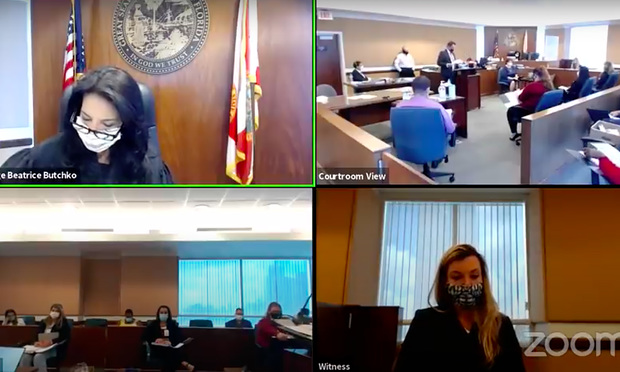Plexiglass, Discreet Texts and Old-School Binders: Inside Florida's First Jury Trial Amid COVID-19
It was a trial with a difference — the difference being a global pandemic.
July 17, 2020 at 01:37 PM
6 minute read
 Miami-Dade Circuit jury trial People's Trust Insurance Company vs. Yusem Corchero et al conducted in person. Photo: Miami-Dade Circuit YouTube channel.
Miami-Dade Circuit jury trial People's Trust Insurance Company vs. Yusem Corchero et al conducted in person. Photo: Miami-Dade Circuit YouTube channel.
An uneventful jury trial was nothing to write home about before COVID-19, but now it's a major feat.
This week, after months of planning and consultations with epidemiologists, Miami-Dade Circuit held Florida's first jury trial since March.
The civil trial was conducted in person and revolved around two lawsuits between a homeowner and insurer, fighting over post-Hurricane Irma repairs.
Matthew Baldwin and Andrew Vargas of Vargas Gonzalez Hevia Baldwin in Coral Gables argued for the plaintiff, while Brandon Waas and George Hooker of Cole, Scott & Kissane in Miami represented People's Trust Insurance. And they say it panned out almost like any other trial — with a few crucial adjustments.
First up was a prequalification phase, usually reserved for long, complex tobacco or medical malpractice litigation, where prospective jurors were quizzed via Zoom about any preexisting medical conditions and whether they'd feel comfortable going to the courthouse in person.
It was a unique experience for Waas, who handled jury selection for the defense. He felt something was lost by doing the process online, as it's harder to gauge how well people are dressed, who's got their arms crossed or who's rolling their eyes when everyone is pictured in a two-inch box on a screen.
"You can't really tell the types of things that you can tell by seeing people in person," Waas said. "The jury foreman, for instance, ended up being someone who I never thought would have been the jury foreperson. He seemed like a young kid over Zoom, and it was like pulling teeth to try to get him to say something. But he ended up being the jury foreperson, and he looked completely different than he did over Zoom."
Plaintiff's attorney Baldwin said he spent the weekend worried about whether all the jurors would show up, considering some had to bow out during prequalification because they'd recently been exposed to someone with the virus, were particularly vulnerable or lived with someone who was. But he was pleasantly surprised.
"We were not sure if they were going to have some last-minute issues that precluded them or made them too nervous to come in person on Tuesday," Baldwin said. "We were glad that they all showed up in person as they promised to do. I think that we picked a good jury in the end."
All the key players who'd normally be in the courtroom were there — just a lot further away than usual. Everyone had to stay six feet apart, was kitted out with face masks and gloves and wore face shields while on the move. There was also plenty of hand sanitizer, and witnesses gave testimony behind plexiglass.
Miami-Dade Circuit Judge Beatrice Butchko presided over the trial, while administrative Judge Jennifer Bailey and Chief Judge Bertila Soto handled logistics.
"I think they went above and beyond to make everybody feel comfortable, and I don't think anybody expressed any reservations that they felt unsafe based on the level of precautions that were taken," Baldwin said.
Connecting through a mask
The biggest adjustment for Baldwin was trying to connect with jurors and witnesses while wearing a mask and face shield.
"You want to establish a rapport with someone and be in the most comfortable position possible to persuade and, obviously, those things were barriers to being able to do that," Baldwin said. "I think we were able to do it. It just took a little more getting used to and some patience to get over the initial discomfort."
Hooker also found it tough to remain nailed to his podium, since he's used to moving around while giving arguments and monitoring jurors' faces for reactions to testimony.
"The jurors were a lot more spread out than normal," Hooker said. "So, to see how everyone was reacting, you had to keep looking around."
Hooker said it also felt pretty "old school" for everyone to have their own exhibit binders in a banker's box.
"Instead of handing things to the jury and moving around, I would have to be like, 'Now, everyone, turn to tab K, page seven,' and you wait for everyone to get there," Hooker said.
No more whispering
Attorneys also had to sit apart, which meant text messages were key.
"Instead of just leaning over and whispering, we had to do everything via text message, and if the other person missed the text message then that was it," Baldwin said.
The trial lasted a full day, and was streamed live on Miami-Dade Circuit's YouTube channel. Jurors awarded the plaintiff $12,000 with a verdict that was nonbinding — an approach often used in arbitration which means the parties are not obligated to act on the result.
But the jury is still out on whether this approach could work en masse in the long term, considering how much time and effort it took to pull off one trial.
"It's definitely doable in cases like this, but if you're looking at much longer medical malpractice or construction defect trials, or things that will last weeks and weeks with hundreds of exhibits, I think it could be a lot more difficult," Hooker said.
It took a pandemic to take this case to trial, according to Waas and Hooker, who said its simplicity presented an opportunity.
"This was a case that I don't think my client, or even the insureds and opposing counsel, would have taken to trial normally," Hooker said. "We did this to sort of do our part to help restart jury trials, and because Judge Bailey and Judge Soto were looking for someone to do it."
It was worth the effort, according to Waas.
"It was very interesting to see how it all played out and to be able to see that firsthand, obviously, was invaluable to us and everyone in the local community," Waas said. "We were very glad to have been given the opportunity to start the ball rolling back toward some sense of normalcy."
Read more:
The New COVID-19 Wrinkle: In-Person Mediation Sparks Concerns
This content has been archived. It is available through our partners, LexisNexis® and Bloomberg Law.
To view this content, please continue to their sites.
Not a Lexis Subscriber?
Subscribe Now
Not a Bloomberg Law Subscriber?
Subscribe Now
NOT FOR REPRINT
© 2025 ALM Global, LLC, All Rights Reserved. Request academic re-use from www.copyright.com. All other uses, submit a request to [email protected]. For more information visit Asset & Logo Licensing.
You Might Like
View All
A Voyeur Videotaped Them Undressing. Should Cruise Ship Passengers Have to Arbitrate?
3 minute read
Read the Document: DOJ Releases Ex-Special Counsel's Report Explaining Trump Prosecutions
3 minute read
Supreme Court Wrestles With Disabled Ex-Firefighter's Discrimination Case

Juror No. 3 Challenges Florida Defense Counsel During Closing Argument
2 minute readTrending Stories
Who Got The Work
J. Brugh Lower of Gibbons has entered an appearance for industrial equipment supplier Devco Corporation in a pending trademark infringement lawsuit. The suit, accusing the defendant of selling knock-off Graco products, was filed Dec. 18 in New Jersey District Court by Rivkin Radler on behalf of Graco Inc. and Graco Minnesota. The case, assigned to U.S. District Judge Zahid N. Quraishi, is 3:24-cv-11294, Graco Inc. et al v. Devco Corporation.
Who Got The Work
Rebecca Maller-Stein and Kent A. Yalowitz of Arnold & Porter Kaye Scholer have entered their appearances for Hanaco Venture Capital and its executives, Lior Prosor and David Frankel, in a pending securities lawsuit. The action, filed on Dec. 24 in New York Southern District Court by Zell, Aron & Co. on behalf of Goldeneye Advisors, accuses the defendants of negligently and fraudulently managing the plaintiff's $1 million investment. The case, assigned to U.S. District Judge Vernon S. Broderick, is 1:24-cv-09918, Goldeneye Advisors, LLC v. Hanaco Venture Capital, Ltd. et al.
Who Got The Work
Attorneys from A&O Shearman has stepped in as defense counsel for Toronto-Dominion Bank and other defendants in a pending securities class action. The suit, filed Dec. 11 in New York Southern District Court by Bleichmar Fonti & Auld, accuses the defendants of concealing the bank's 'pervasive' deficiencies in regards to its compliance with the Bank Secrecy Act and the quality of its anti-money laundering controls. The case, assigned to U.S. District Judge Arun Subramanian, is 1:24-cv-09445, Gonzalez v. The Toronto-Dominion Bank et al.
Who Got The Work
Crown Castle International, a Pennsylvania company providing shared communications infrastructure, has turned to Luke D. Wolf of Gordon Rees Scully Mansukhani to fend off a pending breach-of-contract lawsuit. The court action, filed Nov. 25 in Michigan Eastern District Court by Hooper Hathaway PC on behalf of The Town Residences LLC, accuses Crown Castle of failing to transfer approximately $30,000 in utility payments from T-Mobile in breach of a roof-top lease and assignment agreement. The case, assigned to U.S. District Judge Susan K. Declercq, is 2:24-cv-13131, The Town Residences LLC v. T-Mobile US, Inc. et al.
Who Got The Work
Wilfred P. Coronato and Daniel M. Schwartz of McCarter & English have stepped in as defense counsel to Electrolux Home Products Inc. in a pending product liability lawsuit. The court action, filed Nov. 26 in New York Eastern District Court by Poulos Lopiccolo PC and Nagel Rice LLP on behalf of David Stern, alleges that the defendant's refrigerators’ drawers and shelving repeatedly break and fall apart within months after purchase. The case, assigned to U.S. District Judge Joan M. Azrack, is 2:24-cv-08204, Stern v. Electrolux Home Products, Inc.
Featured Firms
Law Offices of Gary Martin Hays & Associates, P.C.
(470) 294-1674
Law Offices of Mark E. Salomone
(857) 444-6468
Smith & Hassler
(713) 739-1250






